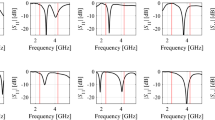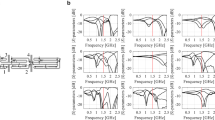Abstract
Modern microwave design has become heavily reliant on full-wave electromagnetic (EM) simulation tools, which are necessary for accurate evaluation of microwave components. Consequently, it is also indispensable for their development, especially the adjustment of geometry parameters, oriented towards performance improvement. However, EM-driven optimization procedures incur considerable computational expenses, which may become impractical even in the case of local tuning, and prohibitive whenever global search is vital (e.g., multi-model tasks, simulation-based miniaturization, circuit re-design within extended ranges of operating frequencies). This work presents a novel approach to a computationally-efficient globalized parameter tuning of microwave components. Our framework employs the response feature technology, along with the inverse surrogate models. The latter permit low-cost exploration of the parameter space, and identification of the most advantageous regions that contain designs featuring performance parameters sufficiently close to the assumed target. The initial parameter vectors rendered in such a way undergo then local, gradient-based tuning. The incorporation of response features allows for constructing the inverse model using small training data sets due to simple (weakly-nonlinear) relationships between the operating parameters and dimensions of the circuit under design. Global optimization of the two microstrip components (a coupler and a power divider) is carried out for the sake of verification. The results demonstrate global search capability, excellent success rate, as well as remarkable efficiency with the average optimization cost of about a hundred of EM simulations of the circuit necessary to conclude the search process.
Access this chapter
Tax calculation will be finalised at checkout
Purchases are for personal use only
Similar content being viewed by others
References
Ma, P., Wei, B., Hong, J., Xu, Z., Cao, B., Jiang, L.: A design method of multimode multiband bandpass filters. IEEE Trans. Microwave Theory Technol. 66(6), 2791–2799 (2018)
Yang, Q., Jiao, Y., Zhang, Z.: Compact multiband bandpass filter using low-pass filter combined with open stub-loaded shorted stub. IEEE Trans. Microwave Theory Technol. 66(4), 1926–1938 (2018)
Hagag, M.F., Zhang, R., Peroulis, D.: High-performance tunable narrowband SIW cavity-based quadrature hybrid coupler. IEEE Microwave Wirel. Comp. Lett. 29(1), 41–43 (2019)
Gómez-García, R., Rosario-De Jesus, J., Psychogiou, D.: Multi-band bandpass and bandstop RF filtering couplers with dynamically-controlled bands. IEEE Access 6, 32321–32327 (2018)
Zhang, R., Peroulis, D.: Mixed lumped and distributed circuits in wideband bandpass filter application for spurious-response suppression. IEEE Microwave Wirel. Comp. Lett. 28(11), 978–980 (2018)
Sheikhi, A., Alipour, A., Mir, A.: Design and fabrication of an ultra-wide stopband compact bandpass filter. IEEE Trans. Circuits Syst. II 67(2), 265–269 (2020)
Firmansyah, T., Alaydrus, M., Wahyu, Y., Rahardjo, E.T., Wibisono, G.: A highly independent multiband bandpass filter using a multi-coupled line stub-SIR with folding structure. IEEE Access 8, 83009–83026 (2020)
Chen, S., Guo, M., Xu, K., Zhao, P., Dong, L., Wang, G.: A frequency synthesizer based microwave permittivity sensor using CMRC structure. IEEE Access 6, 8556–8563 (2018)
Chi, J.G., Kim, Y.J.: A compact wideband millimeter-wave quadrature hybrid coupler using artificial transmission lines on a glass substrate. IEEE Microwave Wirel. Comp. Lett. 30(11), 1037–1040 (2020)
Koziel, S., Abdullah, M.: Machine-learning-powered EM-based framework for efficient and reliable design of low scattering metasurfaces. IEEE Trans. Microwave Theory Technol. 69(4), 2028–2041 (2021)
Rayas-Sanchez, J.E., Koziel, S., Bandler, J.W.: Advanced RF and microwave design optimization: a journey and a vision of future trends. IEEE J. Microwaves 1(1), 481–493 (2021)
**, H., Zhou, Y., Huang, Y.M., Ding, S., Wu, K.: Miniaturized broadband coupler made of slow-wave half-mode substrate integrated waveguide. IEEE Microwave Wirel. Comp. Lett. 27(2), 132–134 (2017)
Li, X., Luk, K.M.: The grey wolf optimizer and its applications in electromagnetics. IEEE Trans. Ant. Prop. 68(3), 2186–2197 (2020)
Luo, X., Yang, B., Qian, H.J.: Adaptive synthesis for resonator-coupled filters based on particle swarm optimization. IEEE Trans. Microwave Theory Technol. 67(2), 712–725 (2019)
Majumder, A., Chatterjee, S., Chatterjee, S., Sinha Chaudhari, S., Poddar, D.R.: Optimization of small-signal model of GaN HEMT by using evolutionary algorithms. IEEE Microwave Wirel. Comp. Lett. 27(4), 362–364 (2017)
Ding, D., Zhang, Q., **a, J., Zhou, A., Yang, L.: Wiggly parallel-coupled line design by using multiobjective evolutionay algorithm. IEEE Microwave Wirel. Comp. Lett. 28(8), 648–650 (2018)
Zhu, D.Z., Werner, P.L., Werner, D.H.: Design and optimization of 3-D frequency-selective surfaces based on a multiobjective lazy ant colony optimization algorithm. IEEE Trans. Ant. Propag. 65(12), 7137–7149 (2017)
Greda, L.A., Winterstein, A., Lemes, D.L., Heckler, M.V.T.: Beamsteering and beamsha** using a linear antenna array based on particle swarm optimization. IEEE Access 7, 141562–141573 (2019)
Cui, C., Jiao, Y., Zhang, L.: Synthesis of some low sidelobe linear arrays using hybrid differential evolution algorithm integrated with convex programming. IEEE Ant. Wirel. Propag. Lett. 16, 2444–2448 (2017)
Baumgartner, P., et al.: Multi-objective optimization of Yagi-Uda antenna applying enhanced firefly algorithm with adaptive cost function. IEEE Trans. Magn. 54(3), 8000504 (2018)
Yang, S.H., Kiang, J.F.: Optimization of sparse linear arrays using harmony search algorithms. IEEE Trans. Ant. Prop. 63(11), 4732–4738 (2015)
Zhang, Z., Cheng, Q.S., Chen, H., Jiang, F.: An efficient hybrid sampling method for neural network-based microwave component modeling and optimization. IEEE Microwave Wirel. Comp. Lett. 30(7), 625–662 (2020)
Van Nechel, E., Ferranti, F., Rolain, Y., Lataire., J.: Model-driven design of microwave filters based on scalable circuit models. IEEE Trans. Microwave Theory Technol. 66(10), 4390–4396 (2018)
Li, Y., **ao, S., Rotaru, M., Sykulski, J.K.: A dual kriging approach with improved points selection algorithm for memory efficient surrogate optimization in electromagnetics. IEEE Trans. Magn. 52(3), 1–4, Article No. 7000504 (2016)
Jacobs, J.P.: Characterization by Gaussian processes of finite substrate size effects on gain patterns of microstrip antennas. IET Microwaves Ant. Prop. 10(11), 1189–1195 (2016)
Ogut, M., Bosch-Lluis, X., Reising, S.C.: A deep learning approach for microwave and millimeter-wave radiometer calibration. IEEE Trans. Geosci. Remote Sens. 57(8), 5344–5355 (2019)
Lim, D.K., Yi, K.P., Jung, S.Y., Jung, H.K., Ro, J.S.: Optimal design of an interior permanent magnet synchronous motor by using a new surrogate-assisted multi-objective optimization. IEEE Trans. Magn. 51(11), 1–4, Article No. 8207504 (2015)
Taran, N., Ionel, D.M., Dorrell, D.G.: Two-level surrogate-assisted differential evolution multi-objective optimization of electric machines using 3-D FEA. IEEE Trans. Magn. 54(11), 1–5, Article No. 8107605 (2018)
Koziel, S., Pietrenko-Dabrowska, A.: Performance-Driven Surrogate Modeling of High-Frequency Structures. Springer, New York (2020). https://doi.org/10.1007/978-3-030-38926-0
Koziel, S.: Low-cost data-driven surrogate modeling of antenna structures by constrained sampling. IEEE Antennas Wirel. Prop. Lett. 16, 461–464 (2017)
Pietrenko-Dabrowska, A., Koziel, S.: Antenna modeling using variable-fidelity EM simulations and constrained co-kriging. IEEE Access 8(1), 91048–91056 (2020)
Koziel, S.: Fast simulation-driven antenna design using response-feature surrogates. Int. J. RF Microwave CAE 25(5), 394–402 (2015)
Koziel, S., Pietrenko-Dabrowska, A.: Expedited feature-based quasi-global optimization of multi-band antennas with Jacobian variability tracking. IEEE Access 8, 83907–83915 (2020)
Koziel, S., Bandler, J.W.: Reliable microwave modeling by means of variable-fidelity response features. IEEE Trans. Microwave Theory Technol. 63(12), 4247–4254 (2015)
Pietrenko-Dabrowska, A., Koziel, S.: Fast design closure of compact microwave components by means of feature-based metamodels. Electronics 10, 10 (2021)
Conn, A.R., Gould, N.I.M., Toint, P.L.: Trust Region Methods. MPS-SIAM Series on Optimization, SIAM, Philadelphia (2000)
Phani Kumar, K.V., Karthikeyan, S.S.: A novel design of ratrace coupler using defected microstrip structure and folding technique. In: IEEE Applied Electromagnetics Conf. (AEMC), Bhubaneswar, India, pp. 1–2 (2013)
Lin, Z., Chu, Q.-X.: A novel approach to the design of dual-band power divider with variable power dividing ratio based on coupled-lines. Prog. Electromagn. Res. 103, 271–284 (2010)
Kennedy, J., Eberhart, R.C.: Swarm Intelligence. Morgan Kaufmann, San Francisco (2001)
Acknowledgement
The authors would like to thank Dassault Systemes, France, for making CST Microwave Studio available. This work is partially supported by the Icelandic Centre for Research (RANNIS) Grant 206606 and by National Science Centre of Poland Grant 2020/37/B/ST7/01448.
Author information
Authors and Affiliations
Corresponding author
Editor information
Editors and Affiliations
Rights and permissions
Copyright information
© 2022 The Author(s), under exclusive license to Springer Nature Switzerland AG
About this paper
Cite this paper
Pietrenko-Dabrowska, A., Koziel, S., Leifsson, L. (2022). Global Design Optimization of Microwave Circuits Using Response Feature Inverse Surrogates. In: Groen, D., de Mulatier, C., Paszynski, M., Krzhizhanovskaya, V.V., Dongarra, J.J., Sloot, P.M.A. (eds) Computational Science – ICCS 2022. ICCS 2022. Lecture Notes in Computer Science, vol 13352. Springer, Cham. https://doi.org/10.1007/978-3-031-08757-8_22
Download citation
DOI: https://doi.org/10.1007/978-3-031-08757-8_22
Published:
Publisher Name: Springer, Cham
Print ISBN: 978-3-031-08756-1
Online ISBN: 978-3-031-08757-8
eBook Packages: Computer ScienceComputer Science (R0)




